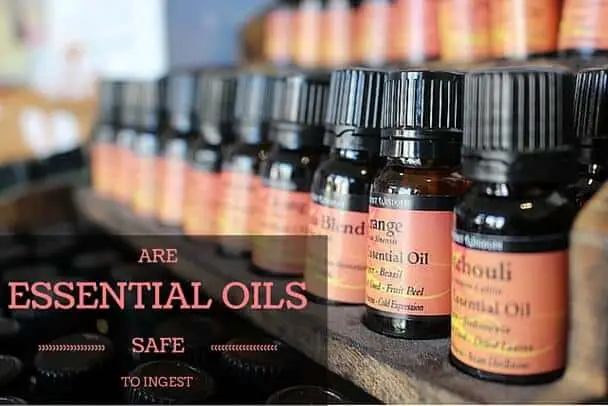With all the information available on the health benefits of essential oils people are always asking, are essential oils safe to ingest or use internally. I’m going to say right off the top that you have to be very careful when ingesting oils. Some are ok to ingest, but putting products in your body is always potentially very dangerous so you should act on professional advice.
If an oil explicitly states it’s safe for ingesting on the bottle then you know you are safe to do so. You will need to dilute the oil and follow the guidelines on the bottle. Don’t try and make your own blends. There are a couple of things to look for in an oil when you’re looking to take it orally, these are:
100% Natural – A lot of oils have chemicals and other additives to add a fragrance or bulk it out in some way. Make sure you’re using high quality, organic, natural oils. You don’t want to put anything into your body that’s not natural.
GRAS – Check if the oil has been labelled as GRAS by the FDA (Generally Regarded as Safe). This means that the product has been tested and cleared to be used internally in the correct concentration.
As with any products you are going to use on your skin or internally, you want to use the best quality oils. Essential oils are produced to offer healing and beneficial properties. You should always look to use the best oils to have the best results, it’s worth the extra few bucks.
Contents
How to Use Essential Oils Internally
Like I mentioned in the opener, you need to act responsibly with oils and not exceed any recommended doses. With that being said there are a few different ways you can use oils that are safe to ingest.
Using Oils with Water
The easiest and most common way to use oils internally is by putting a drop or two in a glass of water. You can make lemon water, which is very refreshing. Or, you can put a drop of a spicy oil like cinnamon in a glass of water for a spicy kick. If the flavours are too strong try mixing a little honey in to sweeten it up.
Using Oils in Gelatine Capsules
You can buy capsules of oils, or you can make your own. You can pick up some empty capsules and pipette in your own preferred oils. Peppermint is a popular choice to soothe stomach upsets and aid digestion.
Using Oils in Foods
There are some ways you can use essentials while cooking. High temperatures will destroy a lot of the properties, so it’s often food grade oils that are used for the flavours. I found some interesting recipes and ideas here on the Young Living blog if you’re interested.
Full List of FDA Approved Essential Oils That Can Be Ingested
As mentioned in the opener oils need to be GRAS to even be considered for internal use. Here is a full list of oils that have been approved for oral consumption by the FDA as found here.
- Angelica
- Basil
- Bergamot
- Chamomile, Roman
- Chamomile, German
- Cinnamon Bark
- Citrus rind (all)
- Clary Sage
- Clove
- Coriander
- Dill
- Eucalyptus globulus
- Frankincense
- Galbanum
- Geranium
- Ginger
- Grapefruit
- Hyssop
- Idaho Blue Spruce
- Juniper
- Jasmine
- Laurus nobilis
- Lavender
- Lemon
- Lemongrass
- Lime
- Melissa (lemonbalm)
- Marjoram
- Myrrh
- Myrtle
- Nutmeg
- Orange
- Oregano
- Patchouli
- Pepper
- Peppermint
- Petitgrain
- Pine
- Rosemary
- Rose
- Savory
- Sage
- Sandalwood
- Spearmint
- Spruce
- Tarragon
- Tangerine
- Thyme
- Valerian
- Vetiver
- Ylang Ylang
Some of the Essential Oils That Are Used Internally
Lemon – Ingesting lemon essential oil has a lot of benefits. It’s best used mixed with warm water and is great for quenching thirst, cough relief, and improving digestion.
Peppermint – Ingesting peppermint essential oils is also easy mixed with water, and tastes great. It can work wonders for stomach cramps and digestion problems.
Ginger – If you like a warm kick then ginger is a good choice. Ginger helps with bowel and stomach problems and can help relieve pain all over the body.
Orange – Another nice fruity flavour is orange. It works as a diuretic and helps the body to flush toxins. Also working as an anti-inflammatory.
Why Should You Ingest Oils?
There are several ways to enjoy the healing properties of oils as I have covered before. Diffusing, applied topically, or a few drops in the bath are all safe and easy ways to use oils. It’s going to come down to preference how you choose to use oils, as well as how your body reacts to certain methods.
If you want to create a clam and relaxing atmosphere and you’re using oils that help to relieve stress then maybe a warm bath is the best method. Or diffusing and just lying in a quiet room. If you have stomach camps for example, you might want to ingest the oils for a quicker result.
Remember that oils are available as a natural and therapeutic method of healing. Take your time and experiment a little. See what works best for you and what you’re most comfortable with.
How to Use Essential Oils Safely
Readers of this blog will know I always preach safety. Here are a few reminders to be aware of when using oils to make sure you’re not risking any personal harm.
- Only use quality oils from reputable brands
- Always use a small test area of skin or just taste a small sample before taking the whole does
- Check the oils you’re using are certified GRAS
- Don’t stray from the recommended uses and amounts, even if you feel you need more
- Adhere to the usual contraindications, if you’re pregnant, have chronic illnesses, other heath conditions, seek medical clearance
- Do not allow children to use oils unsupervised, this post covers babies, children, and essential oils

I’m a MA, (CMT) Certified Massage Therapist, Licensed Massage Therapist (LMT), and Reiki Master — I’m a licensed massage therapist with over 10 years of experience in the industry.


